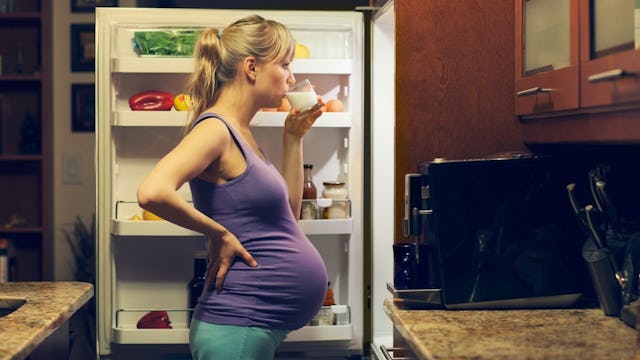This Is The Problem With Pregnancy Food Rules

Since becoming pregnant, most days I lack the mental and physical strength to get out of bed. I’m nauseous all the time. To make matters worse, from the moment I wake up, I have intense hunger pains. They aren’t gradual or patient, and they trigger angst about the days’ meals.
For about a month, the stress of what to eat during the day has been enough to keep me up at night. Too much food and I feel like it’s all coming up. Too little and I will be hungry again in 45 minutes. I don’t know my stomach anymore.
All of this is exacerbated by pressure to eat as clean and healthfully as possible when pregnant. Of course, as a pregnant woman, I believe that I should eat foods that nourish my body as best as possible. But what happens when the pressure to eat right stops you from eating at all? Have we ever considered that the way we have moralized our diet shames and terrifies mothers-to-be so much that they literally can’t stomach the consequences and opt out of eating?
With my first pregnancy, I didn’t have any health complications, but my doctor was concerned about my rapid weight gain. Those conversations about “watching my weight” and limiting my portions stuck with me and led to a really complicated relationship with food.
Donyae Coles, a healing justice writer and yoga teacher for her studio, Fat Witch Yoga had a similar experience. “When I was pregnant with my last child I had gestational diabetes and realized that what was out there for helping to manage that wasn’t great. Suddenly there was this idea that nearly everything I could eat was ‘bad’ and I was really miserable. I know for me the stress and hormones of the pregnancy made just planning meals an extremely charged and unpleasant task,” she explained.
As a result, she made the choice to stop giving food so much control over her life.
“I decided to stop moralizing food in 2012, before my last pregnancy. I realized I was constantly thinking along ‘good’ and ‘bad’ terms and it was making me very unhappy. I adopted HAES (Health at Every Size) philosophy and started changing my life to have a more healthy relationship with food,” she said.
Although I didn’t have gestational diabetes, many women do, and the messages they receive can cause long-term consequences. The panic surrounding such restrictive eating can lead to anxiety and depression.
“I think that even though my situation had a medical component, the entire concept of moralizing food just adds another layer to the stress of pregnancy and pushes women into thought processes that don’t promote their health,” said Coles.
As Coles describes, the pressure to eat an assortment of brightly colored healthy foods has limited me. That stress is intensified when it’s hard to keep most things down. I believe, like non-pregnant people, we should be flexible enough to eat mindfully, but understand there will be times that we must stray from our original plan. Growing a person is hard enough without battling rigid messages about “bad” food and “good” food.
“I mean obviously, don’t eat gas station sushi but people should feel more empowered to trust their bodies and listen to their needs rather than be pushed into ideas of ‘this is good, this is bad,'” she explained.
I’m working to getting into a similar mental space. I won’t punish myself for having a sandwich and some chips if it’s the only thing my stomach accepts. There will probably be even more days when I survive on applesauce, ginger ale, and mandarin oranges. At this point in my life, however, finding the strength to eat anything at all is an accomplishment — and right now, that’s good enough.
This article was originally published on